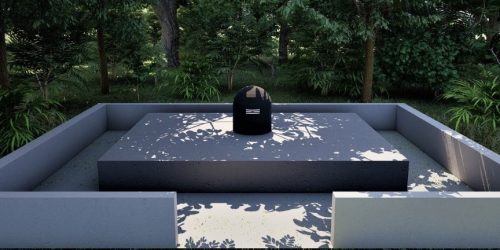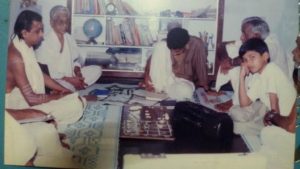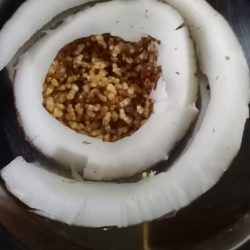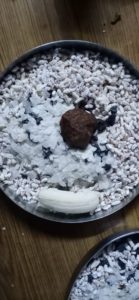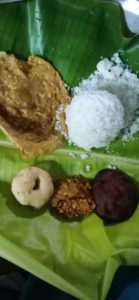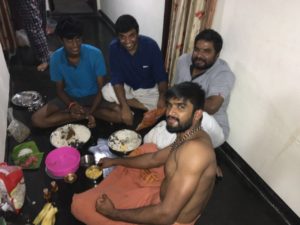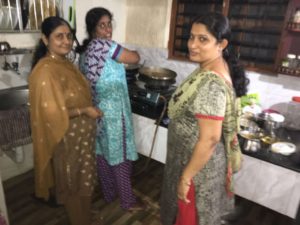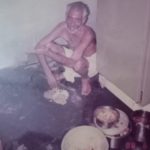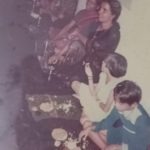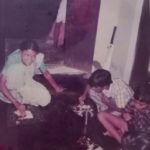Kaappiri
Kaappiri is one of the Genius Loci (Sthala Devatha in Malayalam) of the Aryaveedu family. Other Genius Loci in the family are Sarpam (Nagas), Yakshi, and Rekshas. Kaappiri is a form of Lord Shiva depicting savage / kattalan in Thamo Roopa. Kaappiri protects and materializes the wishes of the devotees.
From our ancestors time, Kaappiri is worshiped by the family with other Deities. It is believed that the Deity is the protector of Aryaveedu and Kuttanappilly Tharavadu, their lands and its members. Kaappiri Kalasa pooja is the ritual followed in the family. Karnavars of the family from Kunjunni Elayadom, Velayudha Panicker, Parameswara Panicker to Velayudhan Elayadom strictly adhered to the family traditions, for the prosperity and well being of the family and the descendants too conform to it.
Kaappiri Prathishta
Kaappiri Prathishta has been consecrated adjacent to the ancestral family house, on a pedestal over the platform called Kaappiri Thara, in the shape of Shiva lingam. Prathishta is outside the temple compound and next to the tharavadu kitchen. In 1999, the entire platform was renovated and Puliyannoor thanthri consecrated and installed (puna prathishta) the Deity. There was plan to relocate the Kaappiri Thara, but in the Ashtamangala Prasnam, it was seen that the Deity wanted to relish the savor of the food from the tharavadu kitchen hence prefer to remain in the present location.
Kaappiri Rituals
Kaappiri pooja was performed by the Guru Karnavar of the family.
After renovation in 1999, the main Kaappiri Kalasa pooja is performed by the family members. On the Prathishta day at Aryaveedu temple, the Tanthri performs Kalasa abhishekam for Kaappiri as part of the annual Kalasa abhishekam.
Family members do the pooja on the Karkidaka Vavu (Amavasi / New moon day) which falls in the month of July – August (the Malayalam month ‘Karkidakam’). Any family member can request to perform the pooja on the New moon day other than the Karkidaka Vavu as offering (Vazhipaadu). For the Kaappiri Kalasa, the family members prepare the offerings at the ancestral house.
As part of the pooja, at Aryaveedu the offering is given to the Deity at Kaappiri Thara and to the Karnavar inside the west corner of the tharavadu. Chural (cane) is kept representing the presence of the Karnavar. At Kuttanappilly, Kalasa pooja is performed by making padmam (specific vedic drawings using powders) in the absence of specific Kaappiri prathishta.
Ashtamangala Prasnam was conducted in 1998 as few bad omens and unwarranted incidents were noted in the family.
In Ashtamangala Prasnam, it was found that the Kaappiri was unhappy. The reason being that the custom followed for Kaappiri Kalasa by ancestors were deviated either by mistake or ignorance of the facts related to the relationship between the Deity and the Karnavar / Guru.
Originally the pooja & offerings were given separately to Kaappiri & Karnavar, one at the Kaappiri Thara and the other inside the tharavadu respectively. In between, offerings to Karnavar inside the house was stopped and the one at Kaappiri Thara only continued. It happened due to the thought that Kaappiri and the Karnavar were one and the same. When only single offerings were given, Karnavar used to take a share of it.
As pointed in the Ashtamangala Prasnam, Deity and Karnavar are separate entity, they needed to be differentiated and heeded off separately. Performed atonement, purification and Kalasa for Kaappiri, and original rituals were reinstated.
Kaappiri Worship & Oblations
The Kaappiri Kalasa pooja is performed in the evening after sunset on the Karkidakka Karutha Vavu.
Kaappiri Thara will be adorned with nilavilakku, flowers & kuruthola (tender leaves of coconut).
Oblations are prepared by the family members at the tharavadu kitchen without tasting and some were prepared without salt. Oblations are roasted rice topped with coconut rings, aval (beaten rice), malar (fried grain), sharkara (jaggery), fruit, honey, tender coconut, other traditional Kerala items like puttu (steamed rice powder with grated coconut), appam, medu-vada, dal-vada, pappadam, toddy, varatharacha kozhi (chicken cooked in a special traditional Kerala style), kozhipidiyan (chicken rice dumplings), karuvadu (dried fish fry), churuttu (cigar) and vettila murukkan (betel leaves paan).
After the pooja & aarti, the offerings are distributed to the family members as prasadam.
In Ashtamangala Prasnam, the Deity negated the stopping of non vegetarian offerings and agreed for replacing toddy with honey mixed in tender coconut water in Aryaveedu Kaappiri Kalasa pooja. At Kuttanappilly, the oblations are vegetarian dishes and no toddy offered.
The current generation should be aware of the significance of all the rituals and should adhere to it.
Family Members Enjoying Prasadam
Kaappiri Anecdotes
Lots of stories connected to Kaappiri were passed down the family by ancestors and other family members. Many recounted encountering profound aroma of cigar and shadow of a person with unusual height and size outside their house during night. Ancestors believed that to be the presence of the Kaappiri protecting the family.
Whenever the traditions were broken, knocks and loud bangs were heard on the wooden door on the southern side of the tharavadu house. Similar bangs were heard at other family member’s houses too. Many elders in the family have heard whistling and whip / swish sounds of cane on air.
